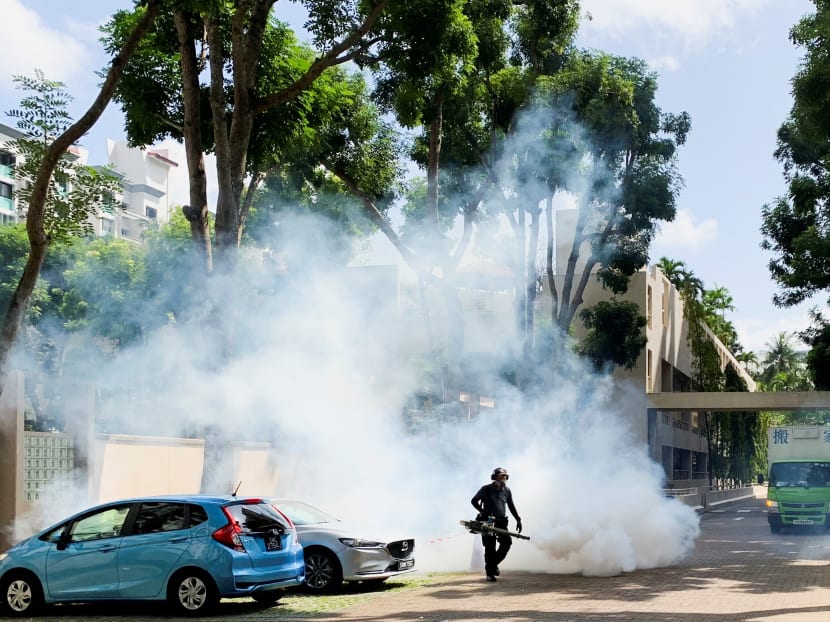More dengue cases expected in 2022; continued work-from-home arrangements a factor: NEA
SINGAPORE — The number of dengue cases this year is expected to surpass last year's "relatively low" tally of 5,258, said the National Environment Agency (NEA) on Tuesday (Jan 25).

A worker fumigates a condominium to prevent the breeding of Aedes mosquitoes, in Singapore on Jan 21, 2022.
SINGAPORE — The number of dengue cases this year is expected to surpass last year's "relatively low" tally of 5,258, said the National Environment Agency (NEA) on Tuesday (Jan 25).
It cited three factors: Low population immunity to a particular dengue serotype, increasing mosquito population and continued work-from-home arrangements.
The Aedes aegypti mosquito population in Singapore grew by about 17 per cent in December 2021 compared to four months earlier, and dengue cases have been on the rise for the past five weeks.
"Concerted community action and sustained vector control efforts are urgently required to prevent escalation of dengue case numbers to outbreak levels," NEA said in a news release on Tuesday.
24 ACTIVE DENGUE CLUSTERS
There were 183 dengue cases reported last week and 24 active clusters as of Monday, four of which are large clusters.
These are located at Cleantech Loop, Jalan Bangau, Denham Close/Dunearn Road/Hua Guan Avenue, and Dunearn Road.
One particular strain of the virus — Dengue virus serotype 3 (DENV-3) — has also been detected in two of the four large clusters.
Prior to 2020, DENV-3 had not been the dominant serotype during any major dengue outbreaks in Singapore over the past three decades, NEA said.
“Population immunity against DENV-3 is low, and more people are susceptible to infection with this serotype," it added.
WANING IMMUNITY
The relatively low number of dengue cases in 2021 was likely due to a two-year outbreak in 2020 and 2019 that created cross-protective immunity in the community.
This type of immunity, which NEA said is "partial and temporary", is the protection against one serotype due to pre-existing immunity developed from past exposure to a different serotype.
"However, cross-protective immunity is short-lived and likely to be waning, leading to weekly dengue cases rising since end-2021," the agency added.
There has also been a rise in the mosquito population, which remains high in some areas of Singapore, including Ang Mo Kio Avenue 3, Hougang Avenue 7, Marsiling Drive/Marsiling Road and Champions Way/Woodlands Avenue 1.
The agency also noted that more people are staying in and working at home, which could translate to more “biting opportunities” for the day-biting Aedes aegypti mosquito, potentially increasing the risk of dengue transmission.
"With the presence of key drivers for dengue transmission — including low population immunity to DENV-3, increasing Aedes aegypti mosquito population, and continued work from home arrangements — we are expecting dengue case numbers in 2022 to exceed that in 2021."
MORE THAN 630,000 INSPECTIONS CARRIED OUT LAST YEAR
NEA conducted about 631,000 inspections for mosquito breeding habitats last year, uncovering about 18,500 such habitats.
Actions were taken against 8,700 premise owners for mosquito breeding, the agency said.
It also issued about 480 summonses and 43 Stop Work Orders to construction sites, and 54 contractors were charged in court for repeat offences.
NEA also said it had detected multiple mosquito breeding in about 770 residential premises inspected, and repeated mosquito breeding in about 1,100 residential premises inspected.
CHINESE NEW YEAR ADVISORY
NEA said it has inspected all plant nurseries "in anticipation" of the Chinese New Year festive season.
Aedes mosquitos can breed in clean stagnant water and as Chinese New Year approaches, "homes and other premises are decorated with more ornamental plants", NEA said.
The agency urged members of the public to take steps to prevent mosquito breeding. Examples include removing stagnant water by lifting and emptying flowerpot plates as well as overturning pails and wiping their rims. CNA
For more stories like this, visit www.cna.asia.






